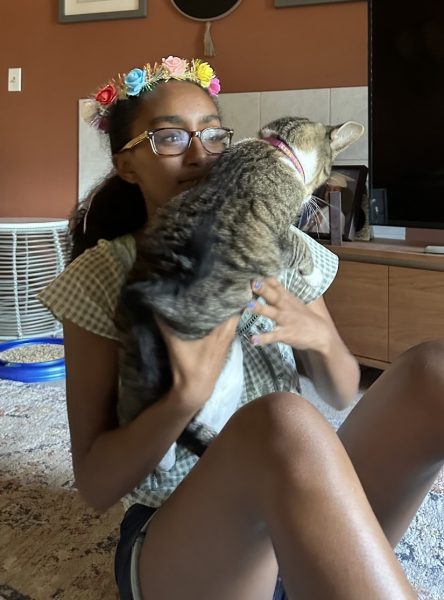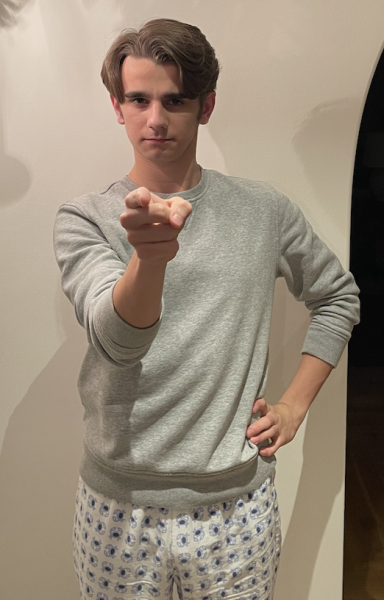What can we say; everyone’s talking about her! One of the most iconic genre-crossing musicians of our time is back with her sophomore album, singing beautiful lyrics that tell the story of a love that, though once passionate, has now fizzled out. The album’s title, “Bewitched,” is perfectly descriptive of the way we all are drawn into her rich and versatile voice. Wait, surely you didn’t think we meant Olivia Rodrigo’s “Guts”? Despite the overlap in these albums’ release dates, these two artists couldn’t be more different.
Laufey (pronounced “lay-vay”) has spent the last few years bringing jazz back into the public eye, most recently with one of her newest songs, “From the Start,” which has reached over 100 million streams on Spotify. With her release, we are here to describe its highs and lows.
First on our list is the first song of the album: “Dreamer” is an excellent introduction, reminding us of all of Laufey’s different elements in one song. It starts with a layering of voices to a slow tempo, before slowly ramping up the beat and incorporating more instruments. An array of drums and chimes showcases some classic jazzy themes to remind us of Laufey’s musical background. The song is humorous in its lyrics and comforting with Laufey’s personable voice. Overall, “Dreamer” is perfect for lying on your bed during the day and dreaming of the future.
Another highlight of this album’s first half is “Lovesick,” which, unlike Dreamer, showcases experimentation with a completely new style of music. As a longtime Laufey fan, it’s obvious that she has primarily been known for her romantic jazz style. “Lovesick” is not this. “Lovesick” is, as Laufey defined, a step into her rock era, experimenting with louder drums, guitar, and background vocals. However, she still includes her iconic elements of romantic strings and heart-wrenching lyrics. It’s new, but it’s still undoubtedly Laufey. It’s perfect for those cinematic moments in life, like driving with the windows down and getting ready for a dance.
In the second half of “Bewitched,” Laufey experiments with mood and sound – with varied results. One of the first songs to appear in this second half is “Misty,” Laufey’s cover of a classic jazz standard. The comparatively minimalistic instrumentation of the song, as well as the song’s pace, sets the mood for the second half of the album: something slower and less energetic, yet still achingly yearning. Her almost-dissonant vocals at the beginning of the song as she pipes out “Look at me” subvert your expectations for what’s to come, before her voice climbs to a higher-than-usual register to almost resemble Aretha Franklin (perhaps the most famous performer of “Misty”). The song takes on a hauntingly ethereal quality, reflecting the supernatural nature of the song’s title and indeed of love itself. Such makes it perfect for any activities where a quiet, bittersweet air of nostalgia and hope is a must: think late-night walks through the autumn leaves, or sitting in bed contemplating the infinitesimal scope of our lives (just us?).
Songs like “Misty” perfectly showcase Laufey’s artistic mission: revitalizing jazz through reinvention. However, in trying to repopularize a genre with a very narrow focus (the theme of love), Laufey walks a fine line between invoking nostalgia and seeming trite. Accordingly, “Letter To My 13 Year Old Self” misses the mark. Whenever we see a song that’s titled something like “Letter to My _____,” we tend to roll our eyes. With some exceptions, they all tend to say the same thing in different ways. Unfortunately, Laufey’s version is no different. A supremely cliché message about things getting better as you grow older is combined with unremarkable instrumentation, leaving the listener feeling bored. We would not fault you for skipping this track.
Nevertheless, Laufey redeems herself with “From the Start.” Beginning with a melody on the guitar, the steady one-two of the snare and bass in the background drive this groovy anthem forward as Laufey’s uniquely low and moody voice swings over the accompaniment to complete the Bossa Nova feel. The energy of this song is a nice contrast to the generally slower second half of the album. Yet, by far the best aspect of this song is its solo: Laufey layers herself scatting over a rift on the acoustic guitar to create something that is short, simple, and yet crushingly beautiful. Though some will gripe that this song is overplayed, it’s our firm opinion that it’s not played enough.


